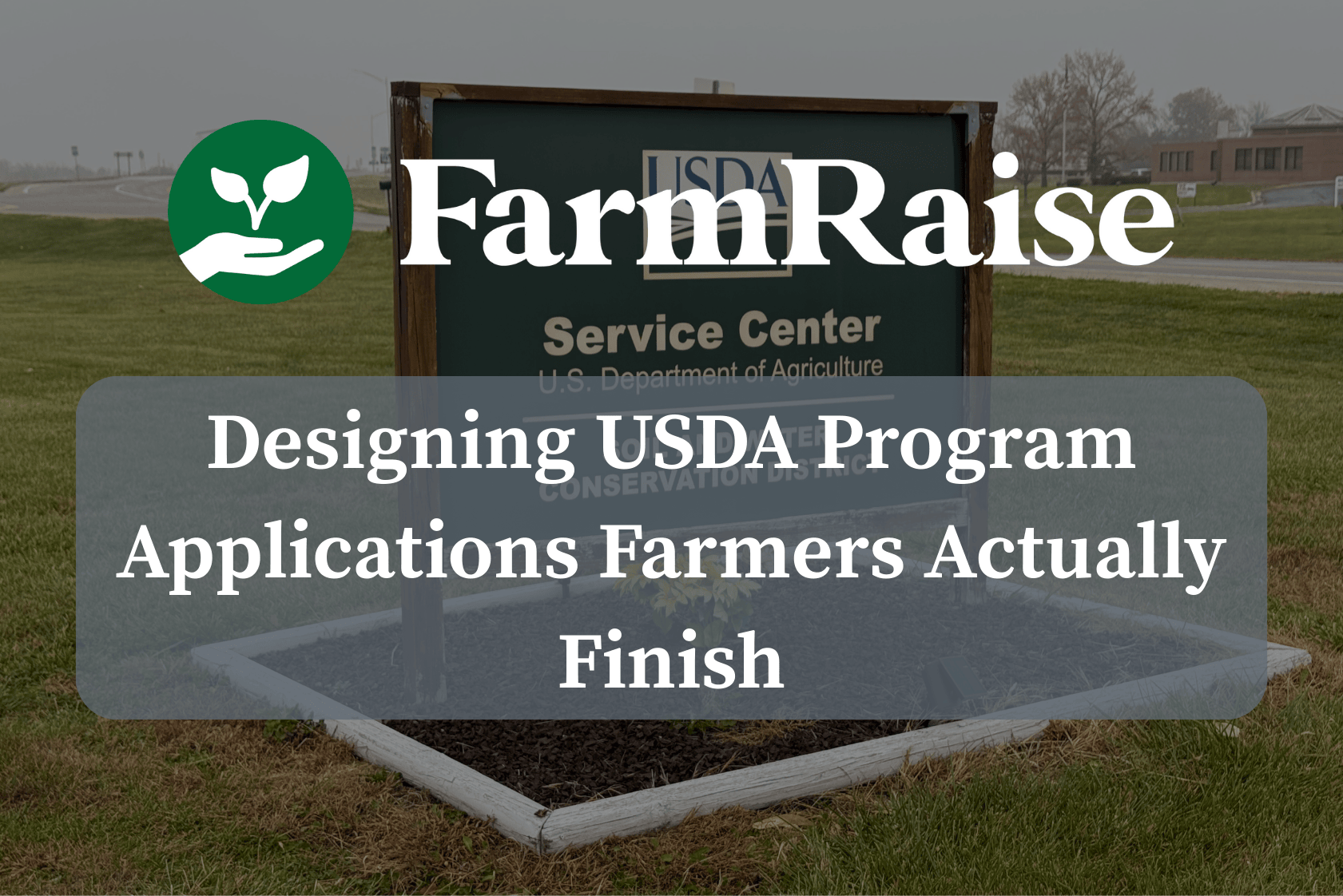The United States Department of Agriculture (USDA) announced this week the opening of the 2024 Regional Conservation Partnership Program (RCPP). A record $1.5 billion in funding has been allocated for the program this year, made possible through the Farm Bill and with supplemental funding through the Inflation Reduction Act (IRA). Prospective partners can submit applications online now through 4:59PM EDT on July 2, 2024.
This is a watershed moment in 2024 for any organization that wants to offer direct financial assistance programs to farmers, ranchers and agricultural producers across the United States. Here’s everything you need to know if your organization is considering applying for an RCPP project in 2024.
What is the Regional Conservation Partnership Program (RCPP)?
RCPP is a financial and technical assistance program offered by the USDA that helps farmers, ranchers and landowners (including forest land) embrace conservation practices that address natural resource concerns and enhance ecosystem health. Projects should focus on conservation practices like cover crops, wetland restoration, soil health and planting wildlife habitat, among other things. The conservation benefits of these practices may include outcomes like improved water quality or increased climate resilience and biodiversity across agricultural land.
RCPP is operated through the USDA Natural Resources Conservation Service (NRCS) as a federal and state initiative. RCPP awards require project partners to make significant partner contributions in the form of in-kind or direct matching contributions from the lead partner and participating stakeholders.
The program operates through two funding pools that have separate applications: the RCPP Classic and the RCPP Alternative Funding Arrangement (AFA). RCPP Classic projects use traditional NRCS contract and easement structures - like the Environmental Quality Incentives Program (EQIP) requirements and conservation practice standards (CPS). RCPP Classic projects require that the lead partner and the NRCS administer participant contracts together.
As an alternative approach, RCPP AFA projects allow the grantee (or “lead partner”) to implement the contracts and financial assistance directly, without involving the NRCS. This allows the lead partner to promote innovative conservation strategies not typically allowed under RCPP Classic. AFA projects awarded in the past have often utilized innovative approaches to conservation, pay-for-performance incentives and investments in large-scale infrastructure.
For 2024’s application cycle, all RCPP projects (including RCPP Classic and AFA types) will prioritize projects that focus on climate-smart agriculture, urban agriculture, conservation and environmental justice. Additionally, the NRCS will prioritize proposals written by historically underserved organizations and Indian tribes. A historically underserved organization is one that involves the significant, direct ownership and/or leadership of people of color, small businesses, women and veterans. Lastly, RCPP projects can be focused on a specific geography (like a state, region or watershed) or on USDA-defined “Critical Conservation Areas (CCAs)” which include regions like the Chesapeake Bay watershed.
Eligible entities for RCPP projects include higher education institutions, Tribal governments, nonprofits, local governments, public housing authorities, independent school districts, small businesses, corporations and other for-profit entities.
How to Apply for the RCPP in 2024
To be the most competitive for 2024’s RCPP funding, it’s important that your project aligns with the most highly-prioritized conservation activities this fiscal year. These include:
- Climate mitigation - carbon sequestration, reducing greenhouse gas emissions (GHGs)
- Climate adaptation, climate resiliency
- Urban agriculture
- Environmental justice
Former NRCS staffer, Kari Cohen, writes that this year’s submissions will be given a “climate impact grade” to comply with IRA’s statutory language.
As you develop your proposal, make sure that you complete the NRCS questionnaire and schedule time to review this questionnaire with NRCS staff ahead of submitting your proposal. This is a new addition to the process, and failing to complete this step may negatively hurt your competitiveness.
In summary, here are the steps to apply:
- Read the NRCS-RCPP website thoroughly.
- Attend an RCPP Applicant Outreach Webinar hosted by the USDA-NRCS. Webinars are offered on April 23, 2024 from 2pm to 4pm EDT and May 30, 2024 from 2pm to 4pm EDT.
- Create a login.gov account.
- Submit a request access form on the RCPP public portal website using the same email address as your login.gov account.
- After 5 business days, your partner portal account should be ready. You’ll be notified via email.
- To log into the public portal website, you’ll need to go to the website, authorize your log in via an integration with login.gov (the system will prompt you), and verify your identity.
- No later than four weeks before the deadline - which is July 2, 2024 - set up a meeting with your NRCS State RCPP coordinator to review your project. It is a good idea to develop a relationship with this individual early on in the process.
- Craft and submit your application using the instructions outlined in the Notice of Funding Opportunity Proposal Guide for Partners.
💡 RCPP Eligibility Tip: While it may be tempting to apply to RCPP funding if you’re a farmer, rancher or individual forest landowner, this initial application period is not intended for individual agricultural producers. Instead, the most competitive applicants are businesses or institutions that can work with multiple agricultural producers to implement projects over a larger geographic area. While you can certainly receive funding through an already funded RCPP project as an individual agricultural producer, you likely won’t be the most competitive applicant for the national RCPP competition.
RCPP Timeline
The USDA is accepting applicants for this fiscal year from now through July 2, 2024. Informational webinars are offered to prospective applicants on April 23, 2024 from 2pm to 4pm EDT and May 30, 2024 from 2pm to 4pm EDT.
After all project proposals are submitted, the USDA will review and select the winners. Usually winners are announced in the late summer or fall of the same year.
Then, after the USDA announces funded projects, there’s often a lag time between projects getting approved and being ready to execute. This is because of the USDA’s negotiation process with awardees. The USDA-NRCS is looking to streamline this process in 2024, reducing negotiation time from 15 months to 6 months. This will be enabled by:
- Simplifying the agreement negotiation process between the USDA and RCPP award winners such that programs can execute their missions sooner.
- Streamlining RCPP partnership agreement documentation, payment processing and funding obligation through updated policies and improved business tooling
- Decreasing the need for waivers for certain eligibility requirements or program activities
- Providing regular and comprehensive training for USDA-NRCS staff at the state and county levels
- Allowing NRCS State Conservationists (essentially the “executive director” of each state NRCS) to approve / support locally led projects
Get Support for your RCPP Proposal
This is an exciting and impactful program that allows for non-gov entities to get involved in scaling conservation-oriented land management across America. Like many NRCS Programs, the RCPP opportunity can be complex to navigate on your own.
It’s important to line up the right partners to help you succeed in your application. We recommend the following resources as you get started:
- Develop a relationship with your State RCPP contact at the NRCS.
- Get to know our team at FarmRaise, who can support your organization as a project partner by facilitating farmer enrollment, contracting, eligibility and compliance paperwork, and proof of implementation. We can even make partner contributions to help bolster your project proposal.
- Read about other USDA grants for funders.
- Research best tips on administering grants to farmers before you craft your application and work these considerations into your project proposal.
Ready to try FarmRaise for free?
Start your free 7-day trial of FarmRaise Premium today.
Ready to try FarmRaise for free?
Start your free 7-day trial of FarmRaise Premium today.
Ready to try FarmRaise for free?
Start your free 7-day trial of FarmRaise Premium today.
See how how easy FarmRaise makes Taxes & Schedule F!
Ready to try FarmRaise for free?
Start your free 7-day trial of FarmRaise Premium today.
Ready to streamline your program management?
See how FarmRaise can simplify farmer-facing program management for your organization.
Ready to simplify payroll on your farm?
See if FarmRaise Payroll is right for you!



.png)
.png)